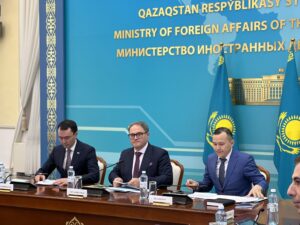ASTANA — The Kazakh Foreign Ministry hosted a briefing on Feb. 18 to explain three new visa categories targeting skilled professionals, entrepreneurs and remote workers seeking long-term opportunities, whether for career growth or business expansion.

Kazakh Foreign Ministry hosted a briefing on Feb. 18 to explain three new visa categories targeting global talent. Photo credit: Nagima Abuova / The Astana Times
These visas include the Neo Nomad Visa (B12-1), Digital Nomad Visa (B9-1), and Permanent Residence Visa (B9).
Deputy Foreign Minister Roman Vassilenko led the briefing alongside Deputy Minister of Tourism and Sports Yerzhan Yerkinbayev and Deputy Chairman of the Artificial Intelligence and Innovation Development Committee of the Ministry of Digital Development, Innovation, and Aerospace Industry Miras Zakiyev.

From left to right: Yerzhan Yerkinbayev, Roman Vassilenko and Miras Zakiyev. Photo credit: Nagima Abuova / The Astana Times
“For nomads, movement was not just a necessity but a way of life. Today, in an era defined by digital transformation and global networks, mobility extends beyond physical borders. The modern nomad of the 21st century is not just a traveler but also an innovator, entrepreneur, and creator. And Kazakhstan is ready to welcome them warmly,” said Vassilenko in his opening remarks.
He stressed Kazakhstan believes that “mobility fuels innovation, and diversity drives progress.”
“This is why we are implementing smart visa solutions, open skies policies, and investment-friendly frameworks—positioning Kazakhstan as both a destination and a gateway to new opportunities,” he said.
“Mobility today is about more than passports and stamps—it is about how people live and work in a hyper-connected world. That is why we have recently introduced these new visa categories,” added Vassilenko.
New visa categories
The Neo Nomad Visa is designed for professionals and digital entrepreneurs who want to live in Kazakhstan while working remotely with foreign income. It is a multiple-entry visa valid for up to one year, extendable for another year. Family members can also obtain visas for the same duration, though work and religious activities are restricted.

The application process explained during the briefing by Kazakh MFA. Photo credit: Nagima Abuova / The Astana Times
To qualify, applicants must show a stable monthly income of at least $3,000, verified through bank statements and tax declarations. They also need an invitation from a Kazakh host, except for citizens of 48 economically developed countries. Other requirements include a certificate of no criminal record and valid health insurance.
The Digital Nomad Visa is intended for IT professionals relocating to Kazakhstan for permanent residence. It offers a single-entry electronic visa valid for one year and a multiple-entry paper visa that can be obtained through the Ministry of Internal Affairs. Applicants must secure a petition from Astana Hub or an authorized IT sector body.
The Visa for Permanent Residence provides a pathway for professionals in high-demand fields such as medicine, science, innovation, education, and the creative industries. It includes a single-entry visa valid for 90 days and a multiple-entry visa issued once per year. Once in Kazakhstan, professionals can transition to permanent residency and integrate into the job market.
Getaway for digital nomads
“Kazakhstan continues to strengthen its position as an open and accessible destination for international visitors. This commitment to openness has become a key factor in the growth of tourism. In 2024, 15.3 million people visited Kazakhstan, which is 66% more than in the previous year,” said Yerkinbayev, noting the timeliness and relevance of the new visas.
“Our target audience consists of financially independent individuals, entrepreneurs, remote employees, and freelancers looking for a long-term stay and the chance to explore Kazakhstan,” he added.
One of the first recipients of the Neo Nomad Visa is Sertac Yener, an expert in finance and energy project development. While working on a clean energy project in the United States, he plans to explore and work in Kazakhstan.
Since its launch, the visa has been granted to seven digital nomads from the U.S., the United Kingdom, Singapore, South Korea and Latvia.
In a recent interview with The Astana Times, Yerkinbayev said Kazakhstan can become a favorite place among digital nomads.
“This program is a significant step towards supporting Kazakhstan’s digital economy and attracting highly qualified foreign specialists. By implementing this program, Kazakhstan fosters innovation and startup development, strengthening its status as a technology hub on the international stage,” said Zakiyev.
During a Q&A session, diplomats, consular representatives, and media attendees engaged with officials on visa policies. Estonia’s Consul Maija Tasa expressed enthusiasm, comparing Kazakhstan’s initiative to Estonia’s digital nomad visa program.
“Kazakhstan is expanding possibilities for professionals and digital workers. We have had a similar program in Estonia for years and have cooperated closely with Kazakhstan,” Tasa told The Astana Times.
A vision for openness and connectivity
Kazakhstan has positioned itself as a gateway for global opportunities by promoting mobility and diversity as key drivers of progress. The country currently offers visa-free entry to citizens of more than 80 countries and has an electronic visa system for 109 countries.
“And we do not intend to stop there,” said Vassilenko.
Under its open skies policy, which extends until 2027, Kazakhstan operates more than 700 international flights per week to over 30 countries. It removes restrictions on flight frequency to attract more carriers and improve global connectivity.
Kazakhstan is also expanding its digital infrastructure, advancing smart cities and increasing high-speed internet access to foster a technology-driven environment. Vassilenko highlighted the country’s integrated e-government system, which allows users to complete transactions such as real estate sales, loan applications and marriage registrations online.
“Kazakhstan has always been a land of nomads – bold, forward-looking, and open to the world. As you reflect on this, please take a moment to explore the fresh from the press brochure on the table titled, Kazakhstan – Born Bold. The brochure and the nicely done map highlight Kazakhstan’s touristic destinations, both famous ones and hidden gems, and its rich cultural heritage, offering a deeper insight into the wonders that await travelers,” said Vassilenko.
